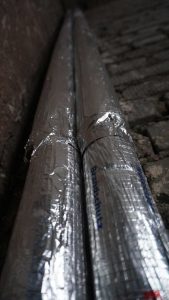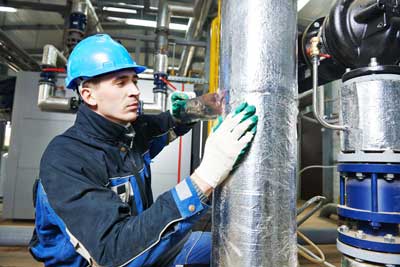

About the Author:
CEO at AlFiPa, responsible for operations as well as purchasing and sales. He is the primary contact for orders and deliveries within the company.
The high resistance and the relatively low cost make aluminum foil suitable for industrial applications. By alloying aluminum with other metals such as magnesium, manganese, copper, nickel, silicon or zinc, a wide range of aluminum alloys and foils with different properties can be produced.
Whether for packaging or for technical applications such as the vapor barrier in house construction or the insulation in piping sytems – aluminum foil offers countless possibilities and is indispensable in any branch of the industry.
Aluminum foil for insulation and vapor barrier in the construction industry
One of the most important fields of application of aluminum foil is insulation. It is used for example as a heat-insulating layer for the insulation of pipes and ducts.

Aluminum foil laminated with scrim with highly effective heat insulation of pipes.
In the construction industry, aluminum foil is also used as a top layer for insulating materials such as stone wool, foam insulation panels and lamellar mats in the insulation of buildings. As a vapor barrier, the film ensures that no water vapor penetrates the insulation material and thus prevents mold formation and moisture damage.
In addition to the vapor barrier property, aluminum foils reflect approximately 96% of radiant heat and are therefore very well suitable for thermal insulation. They can also be easily deformed or coated with a protective varnish which increases their scope of application.
96% of the radiant heat is reflected by aluminum.
Aluminum foils for insulation are available in both dense and perforated versions. The dense insulation is used particularly where a vapor barrier is required, e.g. on basement walls or saunas.
Perforated aluminum foil has tiny holes which allow the circulation of the air, thus preventing condensationn when there are large temperature differences. This is advantageous especially in the insulation of roofing. Aluminum foils with larger holes are referred to as punched or perforated aluminum foil.
Perforated aluminum foil prevents condensation.
Because of its easy handling, the use of aluminum foil allows fast installation even in large buildings such as warehouses.
The lamination of mineral wool with an aluminum foil also reduces the formation of fiber by the mineral wool. As a result, the aluminum foil also improves health protection and safety during the installation of the insulation.
Aluminum foil for insulation of cables
Due to its lightweight and high conductivity, aluminum foil is ideal for the insulation of power cables. This is of particularly important for heavy-duty high voltage cables. It not only improves electromagnetic compatibility but can also be used to localize damage.
In addition, aluminum provides a certain degree of protection against electrical shock caused by damaged cables. The barrier property of the aluminum foil also protects fiber cables from moisture and reduces interference from electronic devices in communication cables.
Aluminum foil as the basis for aluminum tape

Installation of aluminum tape to ensure a continuous insulation
Aluminum adhesive tape is a thin aluminum foil, one side coated with a heat-resistant adhesive. Compared to adhesive tapes made of plastic, aluminum adhesive tape offers the advantage that it is highly thermally resistant. It is not rendered brittle either by heat or cold and is therefore much more durable than plastic adhesive tapes.
Aluminum tape is always used where it has to withstand high or low temperatures.
Aluminum adhesive tape is used especially in heating and ventilation systems. For example, the pipe insulation is wrapped with thin wires which give it the necessary support. The wires are then fixed in place with an aluminum adhesive tape. Joints and interfaces are also covered with aluminum tape to improve the insulation.
Aluminum is also used in the construction industry for example, to close the joints in a vapor barrier or to prevent heat lost as a result of leaking insulation.
In electrical engineering, aluminum tape is used as a shield. For this purpose, housing parts or openings are glued with self-adhesive aluminum foil or aluminum adhesive tape.
Aluminum foils enhance energy efficiency by reflecting almost all heat energy, particularly in construction projects and insulation applications.
Aluminum foil in the packaging industry

Tablets can be safely packaged and blistered thanks to blisters
The rise of aluminum foil in the packaging industry began as early as the beginning of the 20th century. As early as 1910, it was possible to produce up to 10 μ (1/100 mm) thick aluminum foils and laminate them with paper. Technological improvements have led to a rapid development from the use of aluminum as chocolate packaging to the manufacture of aluminum beverage cans, coffee capsules, grill trays and bottle caps.
Aluminum packaging prolongs the shelf life of food products.
Multilayer films made of aluminum with plastic such as PET, PP or PE or paper are also used in a wide range of food packaging, from coffee bags to cheese to yoghurt and sausage packaging.
Aluminum foil is used in pharmacy to safely transport and store medications. Aluminum is particularly suitable for this because it ensures complete insulation against light, gases, moisture and germs. The so-called blister packs allow the hygienic preservation of medication and make it possible to remove tablets individually while the other tablets remain completely protected from environmental exposure.
In the field of cosmetics, the targeted dosage possibilities offered by aluminum tubes and aerosol cans and their hygienic properties play a decisive role.
Further applications for aluminum foil
In addition to the abovementioned applications such as insulation and vapor barrier in the construction industry, insulation in the electrical industry or the applications in the packaging industry there are many other fields of application for aluminum foil. Among the most important we find transport and logistics, vehicle construction and the aerospace industry.
Are you looking for aluminum foil a particular application? We are happy to help!
